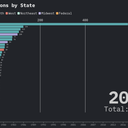A recent editorial in the Philadelphia Inquirer concludes the public is ready to scrap the death penalty in Pennsylvania, even if the legislature is not. According to the editorial, juries opted for the death penalty in just 3% of first-degree murder cases over the past four years: “Pennsylvania juries clearly are more comfortable with the alternative sentence of life without parole, which assures that first-degree murder convicts will waste away behind bars.” The Inquirer cites several different reasons for what they called a “sea change” in attitudes toward capital punishment: “[M]oral qualms about government-sanctioned executions come into play for many jurors. There are also the widely documented instances of wrongful death sentences later being overturned, and data that suggest the penalty falls unfairly on poor and minority defendants who cannot afford to mount an effective defense.” The editorial concludes that replacing the death penalty with life-without-parole sentences is the best choice: “New Jersey abolished capital punishment in 2007; now Pennsylvania should follow that example.” Read full editorial below.
Juries know better
May 20, 2011
Politicians, police, prosecutors, and the state’s top judges may not be ready to face it, but average citizens in Pennsylvania wisely have decided it’s time to scrap the death penalty.
Over the past 4 years, juries opted for the death penalty in just 3 % of 1st-degree murder cases, according to an Inquirer analysis of data supplied by the state courts. That’s a stunningly low number of death sentences, with only 8 people actually condemned since early 2007.
Not only are few murder convicts being added to the state’s death-row population, but the last execution — of torture-murderer Gary Heidnik — occurred a dozen years ago, and only then because Heidnik halted all appeals on his behalf.
Pennsylvania juries clearly are more comfortable with the alternative sentence of life without parole, which assures that first-degree murder convicts will waste away behind bars.
The trend represents a sea change, since the state has the dubious distinction of having the 4th-largest death-row population among the nearly 3‑dozen states that still cling to the death penalty.
There’s no one explanation for the shift, but, surely, the moral qualms about government-sanctioned executions come into play for many jurors. There are also the widely documented instances of wrongful death sentences later being overturned, and data that suggest the penalty falls unfairly on poor and minority defendants who cannot afford to mount an effective defense.
Beyond dispute is that capital punishment is many times more costly for taxpayers, who often fund both sides of the years-long appeals provided as necessary constitutional safeguards under federal and state law.
New Jersey abolished capital punishment in 2007; now Pennsylvania should follow that example. Fortunately, there are progressive voices being heard.
A proposal by state Sen. Stewart J. Greenleaf (R., Montgomery), chairman of the Judiciary Committee, to launch a bipartisan commission to look at the death penalty’s costs is a good first step. Better yet, a bill has been introduced that calls for abolishing capital punishment.
It’s an emotional issue, as evidenced by Chief Justice Ronald D. Castille’s recent criticism of what he called “the zealous pursuit” of appeals in death-penalty cases. But the appeals process is justified when one considers the 33 condemned inmates who have had their sentences reversed over the last decade. This argument is easily settled. Follow the direction of the average jury and stop sentencing people to die.
(“Juries know better,” The Philadelphia Inquirer, May 20, 2011). Read more Editorials on the death penalty.



